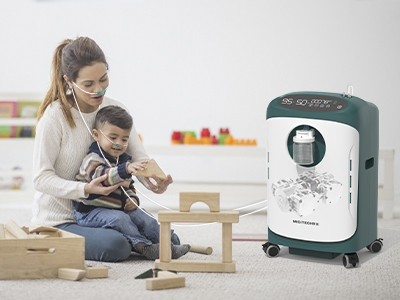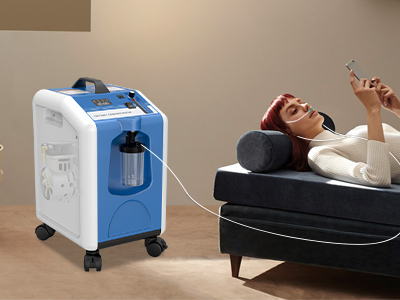14 Sep 2024
Oxygen air compressors have become an indispensable component in the realm of healthcare, where a constant and controlled supply of oxygen is paramount. From emergency rooms to intensive care units, these compressors ensure that critically ill patients receive the life-sustaining oxygen they need. As the backbone of oxygen delivery systems, compressors facilitate a vital connection between patient care and technology.

How Oxygen Air Compressors Work
An oxygen air compressor functions by compressing ambient air, filtering out other gases, and concentrating oxygen for medical use. The process begins when air is drawn into the machine, passed through filters, and then pressurized using a piston or diaphragm mechanism. The compressed oxygen is stored and distributed at specific pressure levels, determined by the medical equipment it's supporting. These compressors are equipped with moisture traps, pressure gauges, and safety valves to ensure a safe and steady oxygen supply. By delivering oxygen in a purified and regulated form, oxygen air compressors play a pivotal role in treating patients with respiratory complications and other critical conditions.
Types of Oxygen Air Compressors Used in Healthcare
Oxygen air compressors used in healthcare come in various forms, each suited to different medical environments. High-pressure compressors are commonly used in hospitals and can provide oxygen to multiple patients simultaneously, while low-pressure compressors are typically used for individual patient therapy. Portable oxygen compressors offer greater mobility, ideal for use in ambulances and home healthcare. Stationary compressors, on the other hand, provide the stability and continuous power needed for larger healthcare facilities. Whether portable or stationary, each compressor type serves a unique function based on the specific medical needs it addresses.

Critical Medical Applications of Oxygen Air Compressors
Oxygen air compressors are indispensable in numerous medical applications, from emergency services to specialized treatment procedures. In ambulances, these compressors are the first line of support for critically ill patients, providing oxygen in life-threatening situations. In hospitals, they integrate seamlessly with ventilators, assisting patients who require respiratory support. Additionally, compressors are used in anesthesia machines during surgeries, ensuring patients receive the right oxygen levels while under anesthesia. For those undergoing oxygen therapy—often prescribed for chronic obstructive pulmonary disease (COPD), pneumonia, or sleep apnea—oxygen compressors provide the steady flow of oxygen necessary to alleviate breathing difficulties.
Standards and Regulations Governing Medical Oxygen Compressors
Given the critical nature of oxygen in medical applications, oxygen air compressors must adhere to stringent standards. Regulatory bodies such as ISO, CE, and the FDA govern the production and usage of medical oxygen compressors to ensure they meet safety, performance, and oxygen purity requirements. Compressors must deliver oxygen that is 93% to 95% pure to avoid any risk of contamination that could compromise patient care. These regulations also extend to safety mechanisms, requiring compressors to be fitted with emergency shut-off systems, pressure release valves, and regular maintenance schedules to prevent equipment failure.
Benefits of Using Oxygen Air Compressors in Healthcare
The advantages of oxygen air compressors in healthcare settings are numerous, with their most significant benefit being the provision of a continuous oxygen supply to patients in need. They enable hospitals and emergency responders to maintain stable oxygen levels for patients with compromised lung function, significantly enhancing patient outcomes. Moreover, the precision of modern oxygen air compressors ensures that oxygen delivery can be finely tuned to the patient's condition, optimizing the treatment process. For patients requiring long-term oxygen therapy, reliable compressors enable a higher quality of life, allowing them to receive treatment in the comfort of their homes without constant medical supervision.
Challenges in Using Oxygen Air Compressors for Medical Applications
Despite their numerous benefits, oxygen air compressors come with their own set of challenges in the medical field. Regular maintenance is essential to ensure that the equipment continues to function properly. In cases where compressors malfunction, there is a risk of patients not receiving adequate oxygen, which can be life-threatening. Furthermore, in emergency scenarios such as power outages, healthcare facilities must have contingency plans in place to keep compressors operational. Training healthcare professionals in the proper use and maintenance of these machines is vital to preventing misuse, ensuring both patient safety and the longevity of the equipment.
Future Developments and Innovations in Medical Oxygen Air Compressors
As with most healthcare technology, oxygen air compressors are evolving rapidly. Innovations in compressor technology are focused on making these machines more portable, energy-efficient, and reliable. Compact designs are making it easier to transport compressors across different medical environments, from ambulances to remote clinics. Additionally, energy-efficient models are reducing the environmental impact of medical oxygen production while lowering operational costs for healthcare providers. The integration of artificial intelligence (AI) in compressor technology is also becoming a reality, enabling predictive maintenance that can anticipate equipment failures before they occur, thus enhancing the overall reliability of oxygen delivery systems.
Conclusion
The oxygen air compressor remains a cornerstone of modern medical care, providing critical support to patients in need of respiratory assistance. From regulating oxygen levels in emergency scenarios to enhancing the quality of life for patients with chronic conditions, these compressors continue to demonstrate their value in the healthcare industry. While challenges exist in maintaining and operating them, ongoing innovations are addressing these issues, making oxygen compressors more efficient and reliable than ever. As medical demands evolve, the role of oxygen air compressors will only grow in importance, ensuring that patients receive the life-saving care they need.
Keywords: air compressor
Originally published 14 Sep 2024, updated 14 Sep 2024.